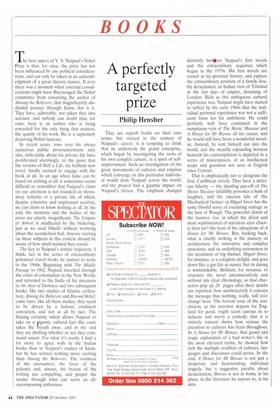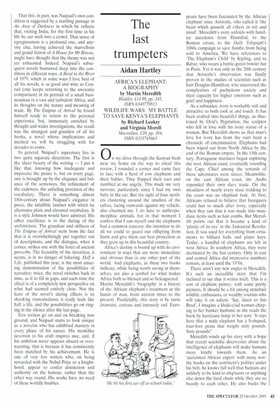A perfectly targeted prize
Philip Hensher
he best aspect of V. S. Naipaul's Nobel Prize is that, for once, the prize has not been influenced by any political considerations, and can only be taken as an acknowledgment of a great literary master. If ever there was a moment when external considerations might have discouraged the Nobel committee from rewarding the author of Among the Believers, that magnificently disdainful journey through Islam, this is it. They have, admirably, not taken that into account, and nobody can doubt that, for once, here is an author who is being rewarded for the only thing that matters, the quality of his work. He is a supremely deserving Nobel laureate.
In recent years, rows over his always audacious public pronouncements and, alas, tittle-tattle about his private life have proliferated alarmingly, to the point that the reviews of Half a Life, his brilliant new novel, hardly seemed to engage with the book at all. In an age when fame can be based on nothing at all, it sometimes seems difficult to remember that Naipaul's claim on our attention is not founded on throwaway remarks or a private life of which, despite extensive and unpleasant scrutiny, we can claim to know nothing at all. In the end, the memoirs and the malice of the press are utterly insignificant; The Enigma of Arrival is unaffected by the bickering, just as we read Othello without worrying about the second-best bed. Anyone starting on these subjects in this context should be aware of how small-minded they sound.
The key to Naipaul's artistic trajectory, I think, lies in the series of extraordinary polemical travel books he started to write in the 1960s. Beginning with The Middle Passage in 1962, Naipaul travelled through the relics of colonialism in the New World, and returned to the India of his ancestors in An Area of Darkness and two subsequent books. His two studies of Islamic civilisation, Among the Believers and Beyond Belief came later; like all these studies, they seem to be driven by a furious, confident conviction, and not at all by tact. The blazing certainty which allows Naipaul to take on a gigantic cultural fact like caste takes the breath away, and in the end they are thrilling whether or not they command assent. For what it's worth, I find a lot more to agree with in the Indian books than in Naipaul's studies of Islam, but he has written nothing more exciting than Among the Believers. The vividness of the encounters, the force of the polemic and, always, the beauty of the writing are compelling, and propel the reader through what can seem an allencompassing unfairness. They are superb books on their own terms, but viewed in the context of Naipaul's career, it is tempting to think that he undertook the grand enterprise, which began by investigating the roots of his own complex culture, in a spirit of selfimprovement. Such an investigation of the great movements of cultures and empires which converge on this particular individual would draw Naipaul across the world, and the project had a gigantic impact on Naipaul's fiction. The emphasis changed
distinctly bebeen Naipaul's first novels and the extraordinary sequence which began in the 1970s. His first novels are rooted in his personal history, and explore the extraordinary position of a family doubly deracinated, an Indian view of Trinidad in the last days of empire, dreaming of London. Rich as this ambiguous cultural experience was, Naipaul might have started to reflect by the early 1960s that the individual personal experience was not a sufficient basis for his ambitions. He could perfectly well have continued in the sumptuous vein of The Mystic Masseur and A House for Mr Biswas all his career, and he would still have been a wonderful novelist. Instead, he sent himself out into the world, and the steadily expanding horizon beneath his contemplation is depicted in a series of masterpieces, of an intellectual scope and grandeur not seen in English since Conrad.
That is emphatically not to denigrate the first, Caribbean novels. They have a delirious hilarity — the dazzling pay-off of The Mystic Masseur infallibly provokes a bark of laughter, and the raucous tale of 'the Mechanical Genius' in Miguel Street has the same blissful sense of escalating outrage as the best of Waugh. The powerful charm of the manner, too, in which the driest and most sophisticated of narrators eyes chaotic lives isn't the least of the attractions of A House for Mr Biswas. But, looking back, what is chiefly striking is the mastery of architecture, the innovative and complex structures, and an underlying seriousness in the treatment of big themes. Miguel Street, for instance, is a complete delight, and goes down like a gin fizz at sunset, but its daring is unmistakable, Brilliant, for instance, to structure the novel unconsecutively and without any clear chronology, so that characters pop up 20 pages after their deaths are reported; how unobtrusively it conveys the message that nothing, really, will ever change here. The fervent tone of the conclusion, as the narrator departs for England for good, might seem curious in so delicate and merry a comedy; that it is entirely natural shows how serious the attention to cultures has been throughout. In A House for Mr Biswas, that grand and tragic exploration of a bad writer's life in the most elevated terms, he showed how rich the multiple conflicts of cultures, languages and discourses could prove. In the end, A House for Mr Biswas is not just a desperate and heartrending individual tragedy, but a suggestive parable about deracination; Biswas is not at home in his place, in the literature he aspires to, in his skin. That this, in part, was Naipaul's own condition is suggested by a startling passage in An Area of Darkness in which he reflects that, visiting India, for the first time in his life he can melt into a crowd. That sense of egregiousness is a profound one, and anyone else, having achieved the marvellous and grand fiction of A House for Mr Biswas, might have thought that the theme was not yet exhausted, Indeed, Naipaul's subsequent novels burrowed deep into the condition in different ways. A Bend in the River of 1979, which in some ways I love best of all his novels, is as good and wise as Conrad (one keeps returning to the awesome comparison) in its portrait of a small businessman in a vast and turbulent Africa, and its thoughts on the nature and meaning of trade. By The Enigma of Arrival he found himself ready to return to the personal experience, but, immensely enriched by thought and wider investigations, the result was the strangest and grandest of all his books, a novel whose implications and method we will be struggling with for decades to come.
In general, Naipaul's supremacy lies in two quite separate directions. The first is the sheer beauty of the writing — I put it like that, knowing how inadequate and imprecise the praise is, but on every page, one is brought up by the elegance and balance of the sentences, the refinement of the cadences, the unfailing precision of the vocabulary. There is something almost 18th-century about Naipaul's elegance in prose, the infallible instinct with which he alternates plain and elevated vocabulary. It is a style Johnson would have admired. His other excellence is in the daring of the architecture. The grandeur and stillness of The Enigma of Arrival stem from the fact that it is overwhelmingly put together out of descriptions, and the dialogue, when it comes, strikes one with the force of ancient proverbs. The fecundity of the invention, it seems, is in no danger of faltering. Half a Life, published this year, is the most amazing demonstration of the possibilities of narrative; twice, the novel switches back in time, as if to fill in gaps, and each time the effect is of a completely new perspective on what had seemed entirely clear, Not the least of the novel's daring effects is its shocking truncatedness; it really feels like half a life, and the possibilities go on ringing in the silence after the last page.
Few writers go on and on breaking new ground. and Naipaul starts to look unique as a novelist who has exhibited mastery in every phase of his career. His monklike devotion to his craft inspires awe, and, if his ambition never appears absurd or overweening, that is because it has consistently been matched by his achievement. He is one of very few writers who, on being rewarded with the Nobel Prize or a knighthood, appear to confer distinction and authority on the honour, rather than the other way round. His works have no need of these worldly baubles.



























































































 Previous page
Previous page